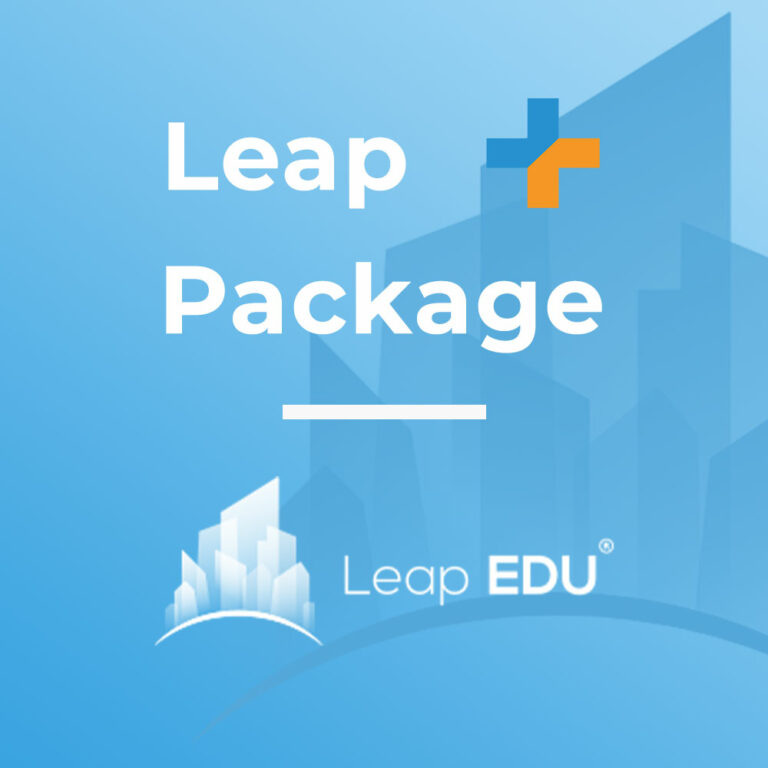NYS 77-Hour Real Estate Salesperson Course
We make it uniquely easy to launch your career
Sign Up Now for our Class!
Course Overview
Leap EDU, has become the region’s preferred provider of the 77-hour New York State Real Estate Sales person Course because of the unique flexibility we offer our students.
CHOOSE YOUR PAYMENT PACKAGE AND FINISH THE COURSE WITHIN 20 BUSINESS DAYS OR UP TO ONE CALENDAR YEAR
- We break down the 77-hour course into 20 classroom modules, which can be taken in any order.
- Register for and begin classes on any day – classes are offered either 10:00am - 2:00pm AM cycle or 6:00pm - 10:00pm PM cycle alternating monthly. *Choose your payment package to determine start deadlines.
- Classes are sequenced to allow you to complete the course in as little as 20 consecutive business days when taken in order as scheduled during an AM cycle or PM cycle each month. Students beginning in the middle of a cycle can carry over to consecutive cycles. *Choose your payment package to determine completion deadlines.
About The Course
Few reasons why you might want to consider a career as a real estate agent in New York State:
- New York ranks as the top paying state for real estate agents, according to the Bureau of Labor Statistics. The average salary you could expect could be as much as $94,000 a year. Once you become a licensed real estate agent, the more time you put into your career, the more your income potential can grow.
- You have the flexibility to create a work schedule that fits your lifestyle.
- If you enjoy meeting new people, you have that opportunity almost every day.
- Your career advancement is under your own control and allows you financial freedom.
- A recent survey conducted by CareerBliss ranked a career in real estate as one of the happiest jobs in the United States.
The first step to a career in real estate in New York State is to take the 77-hour Real Estate Salesperson course
In New York State, you are required to obtain a license before you become a real estate agent.
To be eligible to apply for this license, you must:
- Be at least 18 years of age.
- Be free of any previous felony charges (some exceptions may apply – contact the NYS Department of State for details).
- Provide a Certificate of Completion for the required 77-hour Real Estate Salesperson course.
- Take and pass the school exam and the state exam.
- Have a New York state licensed Real Estate Broker sponsor you.
The course covers 20 modules that can be completed on a flexible schedule
Leap EDU makes it easy to become a real estate agent even if you have a busy schedule. You can complete the 20-module course in 20 straight business days if you start at module SP01; or you can complete over more than one cycle of sessions if you decide to start in the middle of a cycle. The two payment packages provide a schedule with some flexibility to start date and completion date deadlines.
During your course, you will learn the ins and outs if the New York real estate market, including learning about different types of properties, environmental concerns, property valuation and laws pertaining to contracts and fair housing.
Program Packages
Get the scheduling flexibility you want and all the resources you need – including job placement – with Leap EDU’s NYS Real Estate Sales Person Course.
We provide two convenient package options

Registration is always open – start classes on the same day.
- Access to all 20 modules. Start date deadlines & completion deadlines apply.
- One (1) Complimentary School Exam Attempt.
- Access to the mock exam on our website.
- Job placement assistance.
- *See Terms & Conditions and our FAQs for further information.

Registration is always open – start classes on the same day.
- All Leap Package Contents.
- 2 More complimentary school exam attempts.
- Choice of either an e-book or textbook.
- Access To Mock Exam +, 3 Practice Exams With 100 Questions Each.
- *See Terms & Conditions and our FAQs for further information.
MODULE CYCLE STARTS AND COMPLETION DATES
Course Syllabus
Leap EDU, offers a unique approach to the 77-hour Salesperson course, designed for the way people need to obtain career education today.
Rather than require you to adhere to a strict class schedule, we have broken the 77 hours into 20 convenient modules you can take at your own time, pace and schedule. Each module is specific to its topic and is 3.75 hours in length. Although modules are titled “SP1” through “SP20”, none of these need to be taken in sequential order, making it even easier to complete the course at your own pace7
Location:
Course Syllabus:
NYS 30-Hour Remedial Course
You will need to take the New York State 30-hour Remedial Course in order to evolve your Salesperson license to a Broker license if:
- You completed the New York State 45-hour Salesperson Course prior to July 1, 2008, OR . . .
- You have a Real Estate Salesperson license from out of state and want to get licensed in New York State
Leap EDU’s 30-hour Remedial Course will introduce you to the new rules and regulations introduced by the NYS Department of State when it increased the required hours to earn a Salesperson license from 45 to 77.
Flexible classes that meet your busy schedule
Leap EDU has broken the 30-hour Remedial Course into 10 modules, which you can take in any order. The 10 modules are also part of our 77-hour Salesperson Course, which we offer either on a 10:00 am – 2:00 pm AM cycle or 6:00 pm – 10:00 pm PM cycle which alternates on a monthly basis so you will be able to find classes at a time and location that meets your work schedule.


